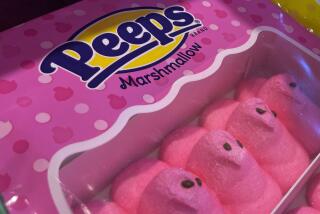Cyclamate Fails to Win Clearance in Cancer Study
- Share via
WASHINGTON — The artificial sweetener cyclamate, banned from the U.S. marketplace in 1969, does not appear to cause cancer by itself, although it may trigger the disease earlier or increase the number of tumors when used in combination with known carcinogens, a National Academy of Sciences panel reported Monday.
“Cyclamate does not have a clean bill of health with respect to the cancer issue, in our opinion,” Dr. Richard J. Havel of the University of California School of Medicine, who served as chairman of the panel, said in an interview.
Havel’s committee, which was asked by the Food and Drug Administration to examine only whether the sweetener could cause cancer, said it is still unclear whether combining cyclamate with saccharin, which has been associated with bladder cancer, increases the chances of contracting the disease. It added, however, that “a small increase in risk among non-smoking women and among users of unusually large amounts has been observed” in four separate studies.
The committee called for the repeat of animal studies that suggested that the sweetener can promote cancer in the presence of known cancer-causing substances. It also urged that countries where cyclamate is still being used conduct monitoring “to determine whether the risk of human cancer is increased in heavy or long-term users or after a long period since first exposure.”
The panel noted that other adverse health effects have been associated with cyclamate, such as gene damage and testicular atrophy, and said that these problems “would need to be considered in detail in the overall evaluation of cyclamate for widespread use.”
End to Ban Sought
In response to the committee’s report, Robert C. Gelardi, executive director of the Calorie Control Council, an association of manufacturers and suppliers of dietary products, called for the FDA to remove its ban. “We believe that cyclamate’s approval will be welcomed by millions of calorie-conscious consumers,” Gelardi said.
Cyclamate, introduced in 1949, came into popular use in the 1960s in food products and beverages when it was combined with saccharin in a ratio of 10 parts cyclamate to one part saccharin. The FDA banned cyclamate in 1969 after studies implicated the mixture with cancer in rats. A 1977 attempt by the agency to ban saccharin was thwarted by Congress.
In the 1970s, attempts by researchers to replicate the results of the original studies failed, raising doubts about the findings, and last year an internal FDA committee concluded that the evidence did not show cyclamate to be carcinogenic. The FDA then asked the National Academy of Sciences, a private organization that conducts research for the government, to examine all available scientific data on the cancer-causing properties of the sweetener.
Abbott Laboratories of North Chicago, Ill., the manufacturer of cyclamate, has twice asked the FDA to return cyclamate to the marketplace.
‘We’re Very Gratified’
“We’re very gratified by National Academy’s comments on what they were supposed to do,” said Richard Kasperson, Abbott’s vice president for corporate regulatory affairs, referring to the report’s conclusion that cyclamate did not cause cancer alone.
As to the report’s findings that the substance could act as a cancer “promoter” or “co-carcinogen,” Kasperson said it was “speculation,” adding that members of the committee “didn’t know what they were talking about.”
Committee chairman Havel, however, said its members “spent a lot of time” examining studies suggesting that cyclamate could enhance the carcinogenic effect of other substances. In one study, cyclamate was incorporated into a cholesterol pellet and implanted into the bladders of mice. In another, it was fed to rats after a carcinogen, N-methyl-N-nitrosourea, had been placed into their bladders. In both experiments, the report said, “more bladder cancers formed in animals receiving cyclamate in combination with other agents than in those receiving the other agent alone.”
Havel said: “We felt these were studies we can’t fault scientifically that do indicate that cyclamate can be a promoter of bladder cancer in rats. You cannot ignore those studies.”
FDA spokesman William Grigg said that further studies are under way on other health questions and that no decision regarding cyclamate is likely this year. “Depending on how the studies come out, a decision may come out by the end of 1986,” Grigg said.






